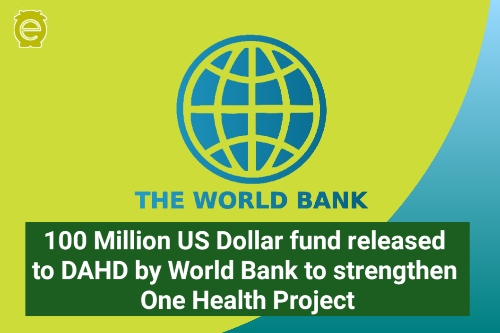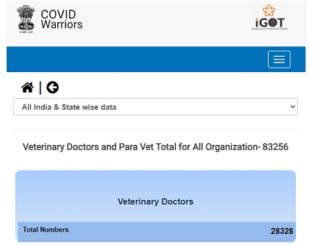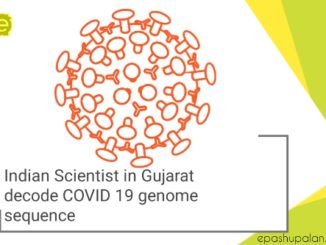Hundred Million US Dollar is allocated to the “Strengthening Pandemic Research and Multi-sector, National Institutions and Platforms for One Health” component of the “India COVID-19 Emergency Response and Health Systems Preparedness Project”.

The primary object of the project component is to develop core capacity to deliver the One Health approach to prevent, detect, and respond to infectious disease outbreaks in animals and humans. Within this context, the component will develop GOI capacity and systems to identify zoonotic disease threats at the animal-human interface. About 75 percent of new infectious diseases originate in animals, including HIV/AIDS, Ebola, and SARS. The component will finance key activities to be implemented by the NCDC, in collaboration with the GOI Department of Animal Husbandry and Dairying and state level Departments of Animal Husbandry, to address policy and actions required to address Emerging Infectious Diseases (EID) of zoonotic potential. Building on the findings of OIE PVS and IHR JEE reports, the component will finance the following activities:
- Conducting a rapid needs assessment of national protocols for detection, surveillance, and response systems for animal and human health infections (including WHO-OIE National Bridging Workshop, NBW);
- Strengthening established mechanisms for detection of priority existing and emerging zoonoses;
- Strengthening surveillance systems for prioritized zoonotic diseases or pathogens of high national public health concern;
- Improving biosafety and biosecurity management, including staff training and proper specimen transportation;
- Strengthening national and state-level One-Health capacity of the animal health workforce (e.g., veterinarians, veterinary paraprofessionals, the public sector and community-based extension workers) to respond to EIDs;
- Establishment of a center of excellence in One-Health, as well other disease outbreak and control research centers; and
- Expansion of the NDDB-managed INAPH for EZID data collection and surveillance in the dairy sector, including data on small ruminants and other livestock species with significant zoonotic risk. A communication strategy will be developed to address community outreach and dissemination of information around risk to the human population of zoonotic diseases.
The World Bank’s Board of Executive Directors approved a fast-track $1 billion India COVID-19 Emergency Response and Health Systems Preparedness Project to help India prevent, detect, and respond to the COVID-19 pandemic and strengthen its public health preparedness. This is the largest ever health sector support from the Bank to India.
This new support will cover all states and Union Territories across India and address the needs of infected people, at-risk populations, medical and emergency personnel and service providers, medical and testing facilities, and national and animal health agencies.
The project will immediately enable the Government of India (GOI) to scale-up efforts to limit human-to-human transmission, including reducing local transmission of cases and containing the epidemic from progressing further. In parallel, interventions to strengthen the health system will be rolled out to improve the country’s capacity to respond to the COVID-19 epidemic and be better prepared to respond to emerging disease outbreaks, including transmission between humans and animals.
Procurement of testing kits; setting up of new isolation wards — including turning hospital beds into intensive care unit beds; infection prevention and control; and purchase of personal protective equipment, ventilators, and medicines, particularly in district hospitals and designated infectious disease hospitals will be scaled up under the project.
“The World Bank is working in close partnership with the Government of India to provide urgent and flexible support to the country as it fights the spread of COVID-19,” said Junaid Ahmad, World Bank Country Director for India. “This operation is expected to enhance surveillance capacities, strengthen diagnostic systems, and expand the capacity of laboratories. But, COVID-19 is not only a health challenge. It has deep social and economic implications. In parallel, we are working with equal urgency with Government on social protection programs and economic measures that protect the livelihoods of people.”
The project will also enhance the resilience of India’s health system to provide core public health prevention and patient care to better manage COVID-19 and future disease outbreaks. It will help strengthen India’s Integrated Disease Surveillance Program, revamp infectious disease hospitals, district, civil, general and medical college hospitals, and build a network of high containment Biosafety Level 3 laboratories.
Today, about 75 percent of new infectious diseases begin with human-to-animal contact, including HIV/AIDS, Ebola, and SARS. The project will develop capacity and systems to detect existing and emerging zoonoses, support biomedical research on COVID-19 by Indian institutions, and upgrade viral research and diagnostic laboratories for testing and research.
It will also help address potential significant negative externalities in the event of a widespread COVID-19 outbreak, including comprehensive health awareness and behavior change campaigns on hygiene practices, wearing masks, social distancing, and mental health and psychological services for vulnerable communities.
The project is financed from the International Bank for Reconstruction and Development (IBRD) in the amount of $1 billion, of which $350 million is provided through the World Bank Group’s COVID-19 Fast-Track Facility. It will be managed by the National Health Mission (NHM), the National Center for Disease Control (NCDC) and the Indian Council of Medical Research (ICMR) under the Ministry of Health and Family Welfare.
World Bank Group COVID-19 Response
The World Bank Group is rolling out a $14 billion fast-track package to strengthen the COVID-19 response in developing countries and shorten the time to recovery. The immediate response includes financing, policy advice and technical assistance to help countries cope with the health and economic impacts of the pandemic. The IFC is providing $8 billion in financing to help private companies affected by the pandemic and preserve jobs. IBRD and IDA are making an initial US$6 billion available for the health-response. As countries need broader support, the World Bank Group will deploy up to $160 billion over 15 months to protect the poor and vulnerable, support businesses, and bolster economic recovery.






Be the first to comment